Tuesday, February 14th 2017

AMD Ryzen Benchmarks Leaked - Amazing Multi-core and Single-core Performance
Benchmarks have leaked on AMD's upcoming Ryzen CPUs, and if accurate, these are the ones that will change the name of the game from "Hype Train" to "Reality Check". Part of a verified Passmark entry, the test system consisted of an AMD Ryzen 8-core, 16-thread ES clocked at 3.4 GHz (which puts it closely on the Ryzen 7 1700X territory, though it isn't known whether Turbo to its rated 3.8 GHz was active or not), seated on an entry-level MSI A320 AM4 motherboard (absent of overclocking functionality) and 16GB of 2400MHz DDR4 memory.
The tests include integer math, floating point performance, prime numbers, encryption, compression, sorting, SSE performance and physics. The AMD Ryzen 7 1700X outperformed every other CPU in 5 out of the 8 tests, including Intel's fastest 8-core chip, the $1099 Broadwell-E i7 6900K. When put side by side against Intel's slightly less expensive $999 8 core extreme edition Haswell-E i7 5960X, Ryzen was faster in 6 out of the 8 tests. The 1700X showed particularly good performance in integer math and encryption, workloads typically associated with server workloads (and where the bulk of the profit is).The average aggregate core Coming in at roughly 4% behind the i7-5960X and 9% behind the i7-6900K - both of which retail for more than double the pre-order price for the 1700X of $389. Consider that this isn't even the highest-clocked Ryzen CPUs about to hit retail, and things look rather good for AMD.Moving on from the multi-threaded benchmarks, Passmark's single-threaded performance test is probably the most interesting one, due to AMD's recent inability to go toe to toe against Intel in single-core performance. This here was definitely the uphill battle for the company, and it would actually seem that Jim Keller and company have managed to do what might seem impossible, simply by looking at AMD's R&D budget deficit compared to its Goliath of an adversary in Intel. Whether or not the sample is running at stock 3.4 GHz sans Turbo (mightily impressive), or at the retail 1700 X's 3.8 GHz Turbo speed (still very impressive), the sample manages to successfully edge out the 5960X and the 6800K, falling behind the 6900K by no more than 3%. That's a very impressive feat, especially when one considers that Intel's i7-6900K and i7-6800K can Turbo up to 4.0GHz and 3.8GHz respectively in single-threaded mode, thanks to Broadwell-E's Turbo Boost 3.0 feature. This means that even if the Ryzen engineering sample was in fact running at 3.8GHz Turbo frequency, it would still be outperforming Broadwell-E clock for clock ever so slightly.Only Intel's i7-7700K Kaby Lake with its 4.5 GHz Turbo manages to distance itself from the 1700X - a 91W 4-core going up against an 8-core chip, rated at only 4 watts higher at 95 W (rated; the jury is still out on real-world testing). And the power efficiency equation gets even more interesting (just not to Intel) when you consider that this Ryzen chip manages to come in at less 45 W TDP than Intel's 140 W i7-6900K. It would appear that AMD really did strike gold with the balance of features and power consumption, as well as multi and single-core performance.
If these benchmarks are real, the hype train has actually just vanished in smoke. Now it's called the Ryzen line, and it most likely represents a much-awaited supply train for AMD's pockets.
Source:
WCCFTech
The tests include integer math, floating point performance, prime numbers, encryption, compression, sorting, SSE performance and physics. The AMD Ryzen 7 1700X outperformed every other CPU in 5 out of the 8 tests, including Intel's fastest 8-core chip, the $1099 Broadwell-E i7 6900K. When put side by side against Intel's slightly less expensive $999 8 core extreme edition Haswell-E i7 5960X, Ryzen was faster in 6 out of the 8 tests. The 1700X showed particularly good performance in integer math and encryption, workloads typically associated with server workloads (and where the bulk of the profit is).The average aggregate core Coming in at roughly 4% behind the i7-5960X and 9% behind the i7-6900K - both of which retail for more than double the pre-order price for the 1700X of $389. Consider that this isn't even the highest-clocked Ryzen CPUs about to hit retail, and things look rather good for AMD.Moving on from the multi-threaded benchmarks, Passmark's single-threaded performance test is probably the most interesting one, due to AMD's recent inability to go toe to toe against Intel in single-core performance. This here was definitely the uphill battle for the company, and it would actually seem that Jim Keller and company have managed to do what might seem impossible, simply by looking at AMD's R&D budget deficit compared to its Goliath of an adversary in Intel. Whether or not the sample is running at stock 3.4 GHz sans Turbo (mightily impressive), or at the retail 1700 X's 3.8 GHz Turbo speed (still very impressive), the sample manages to successfully edge out the 5960X and the 6800K, falling behind the 6900K by no more than 3%. That's a very impressive feat, especially when one considers that Intel's i7-6900K and i7-6800K can Turbo up to 4.0GHz and 3.8GHz respectively in single-threaded mode, thanks to Broadwell-E's Turbo Boost 3.0 feature. This means that even if the Ryzen engineering sample was in fact running at 3.8GHz Turbo frequency, it would still be outperforming Broadwell-E clock for clock ever so slightly.Only Intel's i7-7700K Kaby Lake with its 4.5 GHz Turbo manages to distance itself from the 1700X - a 91W 4-core going up against an 8-core chip, rated at only 4 watts higher at 95 W (rated; the jury is still out on real-world testing). And the power efficiency equation gets even more interesting (just not to Intel) when you consider that this Ryzen chip manages to come in at less 45 W TDP than Intel's 140 W i7-6900K. It would appear that AMD really did strike gold with the balance of features and power consumption, as well as multi and single-core performance.
If these benchmarks are real, the hype train has actually just vanished in smoke. Now it's called the Ryzen line, and it most likely represents a much-awaited supply train for AMD's pockets.
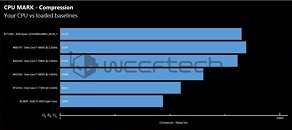
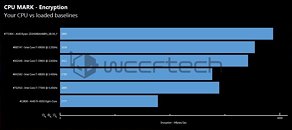
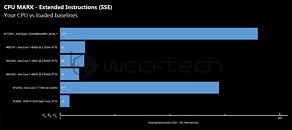
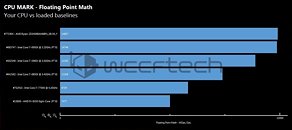
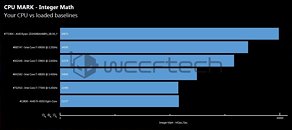

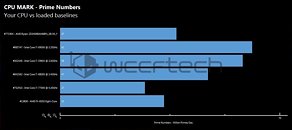
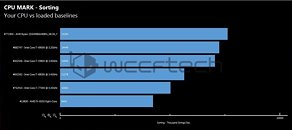
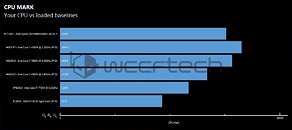
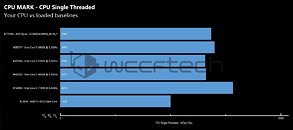
79 Comments on AMD Ryzen Benchmarks Leaked - Amazing Multi-core and Single-core Performance
Really? your going to act like a child and go and say something stupid about where Im from? seriously? your an American right? far out were do i even begin! :slap:
At least we call all agree that Anandtech is Intel bias through and through.
Leaks started happening around 6 months out and they were not looking good.
You can even look back to WCCFTech. If I remember right even WFFCTech called one of them "disappointing performance".
imgur.com/a/JaAtD:
Which AVX is it using?
I remember AMD firing almost all of their marketing team after BD launched.
Also, This from TechPowerUp at the time.
But I think that we should forget the forgettable and concentrate on RyZen. They're releasing some nice teasers and they are much more believable this time around.
I've already begun to save some cash for a Ryzen box.
Comparisons are mostly to the Intel server chips, where more cores and threads are a benefit. Maybe that is AMD's main target? They seem to have better performance overall and if the power consumption and pricing are as low as we've been told, that is a definite win for AMD. A big win too! Intel will definitely need to drop price on this range unless they can come up with something better in a hurry.
But Ryzen seems to be down on single core performance vs Intel for lower level CPUs. This is an arena where single thread speed tends to dominate, and few will see more than a rare benefit from >4 cores. I expect that in most applications (and games) Intel will still have a slight lead with the better i5s and i7s. AMD may force a little price adjustment on them, which would be great!
And I expect some refinement of Ryzen post launch, as was the case for Polaris. Meaning it will improve with better drivers and manufacturing.
With a little competition in the market, we will be the beneficiaries and that is a very good thing.
My expectations are for good gaming performance at a nice price. I really don't care if my Intel boxes beat it, I'll still gladly use it.
In fact, I just decided this week to send one of my X99 boxes to my son (the engineer) to use for rendering his robotics projects. This makes room in my gaming area for the new anticipated AMD box.
This is gonna be a long wait till NDA lift.